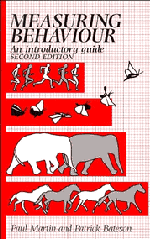Book contents
- Frontmatter
- Contents
- Preface to first edition
- Preface to second edition
- Summary: the steps involved in measuring behaviour
- 1 Introduction
- 2 General issues
- 3 Research design
- 4 Preliminaries to measurement
- 5 Measures of behaviour
- 6 Recording methods
- 7 The recording medium
- 8 The reliability and validity of measures
- 9 Analysis and interpretation of data
- Appendices
- Annotated bibliography
- Index
2 - General issues
Published online by Cambridge University Press: 05 June 2012
- Frontmatter
- Contents
- Preface to first edition
- Preface to second edition
- Summary: the steps involved in measuring behaviour
- 1 Introduction
- 2 General issues
- 3 Research design
- 4 Preliminaries to measurement
- 5 Measures of behaviour
- 6 Recording methods
- 7 The recording medium
- 8 The reliability and validity of measures
- 9 Analysis and interpretation of data
- Appendices
- Annotated bibliography
- Index
Summary
Different approaches to studying behaviour
Not all scientists study behaviour in the same way or ask the same sorts of questions. Historically, psychology (which originally grew out of the study of the human mind) was distinguished from ethology (the biological study of behaviour) in terms of the methods, interests and origins of the two sciences. In this century, comparative and experimental psychologists have tended to focus mainly on questions about the proximate causation of behaviour (so-called ‘how’ questions), studying general processes of behaviour (notably learning) in a few species under laboratory conditions. In contrast, ethologists have their roots in biology and have asked questions not only about how behaviour is controlled but also about what behaviour is for and how it evolved (‘why’ questions).
Biologists are trained to compare and contrast diverse species. Impregnated as their thinking is with the Darwinian theory of evolution, they habitually speculate on the adaptive significance of the differences between and within species. Indeed, many ethologists are primarily interested in the biological functions of behaviour and are wary of proceeding far with laboratory experiments without first understanding the function of the behaviour in its natural context. Studies in unconstrained conditions of animals, and increasingly of humans, have been an important feature of ethology and have played a major role in developing the distinctive and powerful methods for observing and measuring behaviour. In contrast, psychologists have traditionally placed greater emphasis on experimental design and quantitative methods.
Information
- Type
- Chapter
- Information
- Measuring BehaviourAn Introductory Guide, pp. 6 - 24Publisher: Cambridge University PressPrint publication year: 1993
Accessibility standard: Unknown
Why this information is here
This section outlines the accessibility features of this content - including support for screen readers, full keyboard navigation and high-contrast display options. This may not be relevant for you.Accessibility Information
- 2
- Cited by
